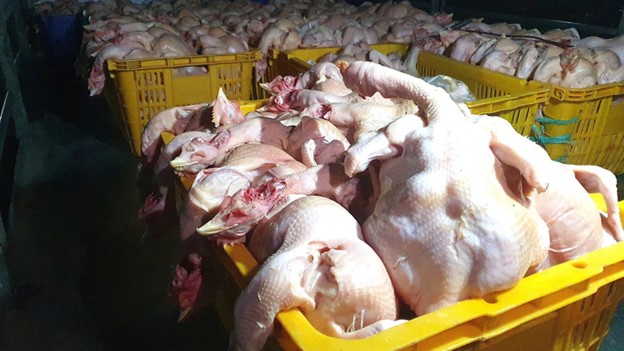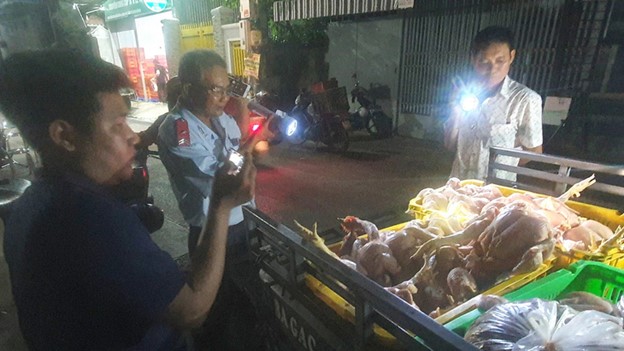Following recent food poisoning cases reportedly caused by eating chicken in Vietnam, local experts have voiced concerns over the origin of chicken products put on sale in the market as poor-quality chicken remains rampant.
Vietnam has even imported discarded chicken from other countries, while smuggled meat products are on the rise.
Discarded chickens are mainly hens that could not lay eggs anymore and those with congenital abnormalities or diseases. They are processed into animal feed in many countries.
Tuoi Tre (Youth) newspaper found that poultry products are diverse and sold at competitive prices in Ho Chi Minh City.
At Tan Dinh Market in District 1, chicken is put up for sale at low prices although the market is known as a place for the rich.
Whole chicken and chicken wings, legs, and feet are priced at VND150,000-250,000 (US$6-10) per kilogram.
"The chicken is industrial chicken but it is of clear origin," a chicken trader at the market said, adding that she has sold chicken meat there for years, anyone eating her chicken and developing health issues could ask for her responsibility.
Many poultry product stalls at Ba Chieu Market in Binh Thanh District are offering pastured chickens, as confirmed by traders.
They said that these chickens are transported from the Mekong Delta, as well as neighboring Binh Duong and Dong Nai Provinces, to Ho Chi Minh City.
Nguyen Thi An, a chicken trader, said she bought the products from wholesale markets and had origin traceability certificates for her chicken.
She added that the market management board often checks stalls.
Chicken is also sold online.
However, it is a matter of luck to buy high-quality chicken, said Thien Huong, a consumer in Phu Nhuan District.
|
|
| Many recent food poisoning cases in Vietnam are reportedly caused by chicken. Photo: A Loc / Tuoi Tre |
High chicken consumption
According to the General Department of Vietnam Customs, chicken and by-product imports to the country increase annually.
Chicken smuggling is rife, posing a risk that Vietnam might become a large importer of livestock products.
The Southeast Asian country currently imports meat and meat-based products from 37 markets worldwide.
South Korea, the U.S., Brazil, Poland, and Russia are Vietnam’s major chicken exporters.
Economic expert Nguyen Vi Xuan referred to research findings from market research firm Ipsos, indicating that Vietnam's chicken consumption volume has increased 8.5 percent annually over the past decade, and it appears to be growing at a faster rate than pork consumption.
In particular, each Vietnamese person consumed nearly 17 kilograms of poultry products in 2020.
The figure rose to some 20 kilograms in 2022 and 22 kilograms last year.
Vietnam consumes over 674 metric tons of chicken imports per day.
Xuan voiced his concerns over the food safety problems of smuggled chicken.
Nguyen Kim Doan, vice-chairman of the Dong Nai Livestock Association, said detected meat smuggling cases are just the tip of the iceberg.
Vietnam’s regulations on the importation of livestock products remain loose and have many loopholes compared with countries with a developed livestock sector.
There have been many shortcomings in food safety inspections, Doan noted.
The influx of livestock products into the country poses a risk to local consumers, particularly in terms of potential exposure to infectious diseases, he added.
A leader of the Vietnam Poultry Association said the country even buys products that other countries do not eat, such as discarded chickens and chicken skin, necks, swings, and feet.
“A high volume of discarded chickens without heads and swings have been shipped from South Korea at low prices. The import of low-cost chickens raises concerns over unsafe food,” the leader noted.
Food poisoning risk caused by chicken
According to doctor Tran Thi Hieu from the Thu Duc Regional General Hospital in Ho Chi Minh City, the scorching weather would pave the way for the growth of bacteria, which cause food to get stale.
Improper processing and preservation may result in food poisoning.
Chicken rots easily. Once bacteria, such as Salmonella, Campylobacter, and Escherichia coli, develop in food, they can produce poisons.
Doctor Hieu advised that during the summer months, it is not only chicken but also other dishes that should be consumed within two hours after being cooked.
She suggested eating well-done poultry meat.
Meanwhile, doctor Tran Ngoc Luu Phuong from Nguyen Tri Phuong Hospital in Ho Chi Minh City said residents who develop symptoms of a fever above 38.5 degrees Celsius, abdominal bloating, continuous vomiting, numbness in the hands and feet, and the inability to drink should visit medical centers.
In the past month, Nha Trang City, the capital of south-central Khanh Hoa Province, has recorded several cases of food poisoning.
Tragically, these incidents led to the death of a fifth-grade student and the hospitalization of hundreds of people.
The affected reportedly consumed dishes such as chicken rice, bread with shredded chicken, or fried eggs.
Like us on Facebook or follow us on X to get the latest news about Vietnam!





















































